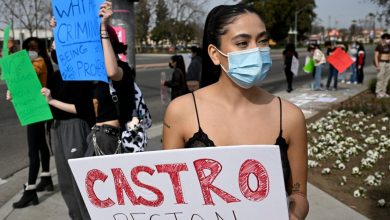How Social Media Is Fueling Protests Against Campus Sexual Assault

[ad_1]
Over the course of a week in early September, Jordan Musantry and her fellow students at Auburn University received three emails from the administration about sexual assaults reported on campus.
The last one, sent last Tuesday, detailed a rape reported to have occurred at a fraternity house, but it didn’t name which one, to many students’ frustration.
In a campus-safety chat on the GroupMe app, Musantry, a sophomore, organized a protest for that evening at Toomer’s Corner, a landmark in the Alabama city and popular meeting spot.
Musantry said she expected 10 people to show up. Instead, 500 did, she estimates.
The activism at Auburn unfolded in what’s now a familiar pattern on four flagship campuses: An assault is reported or rumored to have happened at a fraternity house. Word spreads on social media, where activist accounts pop up to rally students, call out the fraternity, and draw attention to the college’s alleged mishandling of sexual-assault cases. An online petition calls for the fraternity to be suspended or banned.
At night, students gather by the hundreds, carrying signs with slogans such as “I Believe Women,” “No Means No,” and “Don’t Rape.” Eventually, the protesters go home, but vow to show up again the next day.
Though campus protests of sexual assault are nothing new, the shape they’ve taken in recent weeks reflects the growing influence of digital activism and shrinking patience for the pace of change — by college administrators and policy makers alike.
The protest at Auburn was inspired, in part, by demonstrations this semester at the Universities of Nebraska at Lincoln and of Kansas, Musantry said. She’d seen posts about them on the social-media platform TikTok.
Days after Auburn’s sexual-assault protest, one erupted at the University of Massachusetts at Amherst, over an anonymous post on the social-media app YikYak by a woman who said she’d been drugged and assaulted at a fraternity house.
Katherine S. Cho, an assistant professor of student affairs in higher education at Miami University, in Ohio, said the protests and social-media campaigns had accomplished an important goal for student activists — threatening colleges’ reputations.
Students are trying to make clear to administrators that keeping a fraternity on campus could harm the college’s image because it shows the college doesn’t care about students, Cho said.
“You look at the mission of colleges and universities,” Cho said. “Essentially students have to outline that this is actually a threat to that [the mission], document it, and then convince enough people that that’s actually happening.”
Students are using social media to document their colleges’ betrayal of the promises they made to keep students safe, Cho said. The documentation creates a “digital archive” of the unmet demands, mishandled complaints, and concerning statistics — not only at one’s own college, but at hundreds of others.
Thanks to social media, she said, “students are able to find out faster how much the institution doesn’t care, and are able to more quickly amplify, highlight, and illuminate that the institution doesn’t care.”
At the University of Kansas, multiple Instagram accounts have popped up in recent weeks to post photos from protests, announce demonstrations, and share news articles and statistics. Resembling zines from previous activist movements, the accounts offer infographics that explain the context behind the protests.
The sense that an institution does not take students’ demands seriously runs deep. After last summer’s Black Lives Matter protests, many colleges committed themselves to racial-justice efforts, but material changes have been limited, Cho said.
This feeling of institutional betrayal — a term coined by Jennifer Freyd, a former psychology professor at the University of Oregon — dates back decades, Freyd told The Chronicle.
“The fact that we see in study after study that sexual assaults are, on average, noticeably higher in fraternity environments and other student living situations, and that universities keep allowing fraternities on campus, is really a problem,” Freyd said. “Students are being betrayed by that, whether they feel it or not.”
This semester’s protests come as federal regulators grapple with the future of policies that govern how colleges handle sexual assaults. In March, President Biden signed an executive order directing the Education Department to review Title IX rules, created by the previous administration, that expanded the rights of the accused. Advocacy groups have pushed the Biden administration to scrap those Trump-era rules, but action might not come until next year.
Charles H.F. Davis III, an assistant professor at the University of Michigan at Ann Arbor’s Center for the Study of Higher and Postsecondary Education, said students are, in essence, asking colleges to reimagine their systems of accountability, for sexual assault and Greek life in particular.
“We have those [fraternity] chapters who have been routinely and repeatedly found in violation of student codes of conduct related to not just campus sexual violence, but rape culture more broadly, remaining on campus,” he said. “We know that those have deep ties with alumni, with socioeconomics at the university itself. And so I think people are asking for … a revamping of this entire system of accountability as we know it that isn’t vulnerable to being undermined by these other pieces of the college-university industrial complex.”
Cho said frustration with those dynamics is what’s driving much of this wave of activism.
“I think about Fannie Lou Hamer’s really famous quote — ‘I’m sick and tired of being sick and tired,’” she said, referring to the civil-rights activist. “That sick and tiredness is because of the systemic, continuous, unrelenting failure of institutions and organizations in which we have been told to trust.”
That was the mood at Auburn’s protest last week, Musantry said. “Everyone was just frustrated. It wasn’t somber, but it wasn’t celebratory,” she said. “We shouldn’t really have to be doing this.”
The activists called on Auburn to release the name of the fraternity where the assault allegedly took place. A Change.org petition demanding the name’s disclosure has racked up more than 3,000 signatures.
Auburn’s student-affairs division is hosting a town hall about preventing and reporting sexual assault on Wednesday, the university announced last week.
In the meantime, Musantry has a clear message for sexual assailants: “You’re not going to do this and get away with it.”
[ad_2]
Source link






